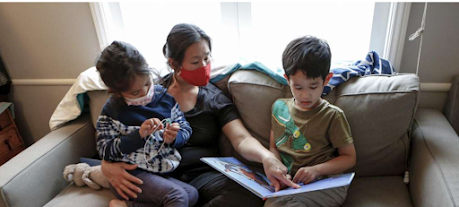 |
| Source: Good Morning America |
By Sam Piha
When the COVID-19 pandemic struck in 2019, many of us thought that this would only last a couple weeks. For some time, we thought of it as an acute crisis, as opposed to a chronic crisis. When communities were locked down and schools were closed, our views changed. Afterschool programs quickly pivoted to ensure that their youth and their families received food, supplies and needed resources for learning.
Recently we surveyed 37 afterschool leaders (directors, coordinators, trainers, etc.) to learn more about how afterschool programs were affected by the pandemic over time. We asked two questions: “How has COVID-19 changed your afterschool program?” and “Do you think these changes are permanent?”
Below we offer a summary of what we learned and cite some direct quotes from respondents.
Negative Impacts
Many responded that the pandemic created a staffing shortage (over 59%) and resulted in a reduction of afterschool services and attendance (both 30%). They reported other negative impacts on their programs, including
- the elimination of field trips,
- decrease in budget and volunteer resources,
- decreased connection with the community, parents, and youth,
- increase in participant waitlists,
- increase in the need for SEL services, and
- staff burnout.
 |
| Source: www.ibcces.org |
"Covid protocols have changed the family interaction with our program as we have not been able to hold our in-person family events." – Afterschool Program Administrative Secretary, California
 |
| Source: Middlesex YMCA |
The negative impact on schools included a shortage of teachers, substitutes, and school-bus drivers. The negative impact on youth included
- loss of school and peer relationships,
- fear of COVID, and
- learning loss.
"COVID has shifted our focus to social and emotional support to students throughout the school day, especially in their classrooms and during non-structured times like lunch. Intentional community building is a big part of this kind of support -- with school-wide activities and initiatives to promote a sense of well-being. We are using contract funds to bring in mental health clinicians to support both students and families." – Afterschool Program Director, California
They also reported negative impacts on families, including family relationships and an increased demand for afterschool programs.
"COVID-19 has created a demand from families for after school care, families need a safe place for their children to be while they work. Families have more needs, not only for children to be safe after school, but for a place that is able to provide supper/snacks, assistance with homework and before school care as more and more families begin to work either graveyard or 2nd shifts in places of employment. Before and after school care programs offer many families working in education the ability to drop off their children at their own schools where they work." – Afterschool Program Staff, California
Positive Impacts
Many also reported positive impacts including a stronger relationship with host schools and a greater appreciation among parents and educators regarding the support offered by afterschool programs.
"The families in the community are coming to realize how important after school programs are for them to be able to have a safe place for their children." – Afterschool Program Coordinator, California
"When the pandemic started and schools were closed, the afterschool coordinators were key players on making sure the families received information and schools knew what families needed to support learning at home. From there, the leader’s roles changed to case management and technology ambassadors. We partnered with the district and other CBOs to ensure the families could have their basic needs met. These actions strengthened our relationship with teachers, school administrators and families." – Afterschool Program Director, California
"We developed more flexibility and creativity in delivering programs and serving our students. Our adapting to create and provide a large number of valuable virtual classes was greatly appreciated by students, parents, and school administrators." – Afterschool Provider, California
Permanent?
When asked if these impacts were permanent, most thought they would eventually fade, but not for 2 or more years.
"I am hopeful that these impacts are not permanent, however, I expect it to take roughly 2 years to get back to where we need to be." – Afterschool Program Director, California
"I don't think that these negative impacts will be permanent. However, I do think that, academically, it will take a considerable amount of time to get these students back up to grade level. Emotionally, it may take years for these kids to recuperate from having a stifled social life due to the pandemic." –Afterschool Program Coach, California
YOU CAN SAY THANKS!
When the COVID-19 pandemic struck in 2019, we gained a new understanding of why afterschool workers are essential workers. Over the last two years, afterschool programs have pivoted to meet the new needs of schools, youth and their families. Afterschool Professionals Appreciation Week (April 25 – 29, 2022) is a perfect time to say “thanks” to afterschool workers.
Begin planning how you will celebrate and acknowledge afterschool programs. To learn more, access talking points and a communication toolkit, go to https://naaweb.org/ideas.







No comments:
Post a Comment